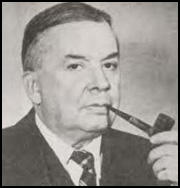Wythe Williams

Wythe Williams was born in Meadville, Pennsylvania, in 1881. He attended the Ohio Wesleyan University before joining the Minneapolis Tribune as a reporter in 1905. The following year he joined Milwaukee Sentinel but later worked as a foreign correspondent for the New York Times. In 1913 Williams married Viola Irwin and over the next few years she gave birth to three sons, Wilbur, David and Ian.
In 1913 Williams was appointed as the bureau chief of the New York Times in Paris. Soon after arriving in the city he was visited by Walter Duranty. He took with him an article about the pilot, Adolphe Pégoud, who had just completed the world's first "looping the loop". Williams claimed that Duranty had "no sense of journalism" and therefore could not publish it. Duranty replied: "I know that... You please rewrite it and let me watch how it is done." Williams recalled in Dusk of Empire: The Decline of Europe (1937): "I did so with Duranty looking over my shoulder, and gave this well-known journalist his first lesson in preparing copy for a newspaper." Duranty continued to visit Williams: "His eyes always shining as he asked questions about what made up the news." Duranty brought several ideas for stories and eventually, in December, 1914, he decided to employ Duranty: "He (Duranty) finally talked himself into a position because he talked so much I could no longer refuse him and arranged with the New York Times to give him a salary."
On the outbreak of the First World War in 1914 Williams, still based in Paris, was in a good position to report on the war. During the first few months of the war most countries publicized stories of enemy soldiers committing atrocities. It was believed that it would help persuade young men to join the armed forces. As one British general pointed out after the war: "to make armies go on killing one another it is necessary to invent lies about the enemy". These atrocity stories were then fed to newspapers who were quite willing to publish them. British newspapers accused German soldiers of a series of crimes including: gouging out the eyes of civilians, cutting off the hands of teenage boys, raping and sexually mutilating women, giving children hand grenades to play with, bayoneting babies and the crucifixion of captured soldiers. Williams investigated these stories for the New York Times and reported "that none of the rumours of wanton killings and torture could be verified."
Other journalists who joined Williams in France included Richard Harding Davis, Philip Gibbs, Percival Phillips, William Beach Thomas, Henry Perry Robinson, Herbert Russell, Floyd Gibbons and William Bolitho. However, Williams got into serious trouble with the authorities in April 1917 when he sent an article criticizing French politicians and generals over the failed Nivelle Offensive without submitting it for approval. He was only saved from deportation by the intervention of George Clemenceau. Williams was now transferred to army headquarters and Walter Duranty took over as the newspaper's main reporter from the front-line. His book, Passed by the Censor: The Experience of an American Newspaper Man in France was published in 1923.
Williams continued to work in Europe and over the next few years he was based in London and Berlin. In June 1939 Williams predicted that Adolf Hitler and Joseph Stalin would sign a military non-aggression agreement. The Nazi-Soviet Pact was announced on 28th August. He immediately claimed that a war would break out in Europe. This was proved correct when Neville Chamberlain declared war on 3rd September, 1939. Williams also predicted the invasion of Denmark by the German Army two months before it happened.
As well as working for the New York Times Wythe Williams also contributed to the Daily Mail, Collier's Magazine, the Saturday Evening Post and the Philadelphia Public Ledger. He also worked as a political commentator for the Mutual Broadcasting Systems. Williams, who was the founder and first president of the Overseas Press Club of America.
Other books by Williams included This Flesh (1931), Dusk of Empire: The Decline of Europe (1937), Riddle of the Reich (1941), Secret Sources (1943) and The Tiger of France: Conversations with Clemenceau (1949).
Wythe Williams died of cancer in June, 1956.
Primary Sources
(1) Sally J. Taylor, Stalin's Apologist: Walter Duranty (1990)
Wythe Williams said later that Duranty was one of those most willing to believe in the wickedness of anything German. Upon hearing the atrocity propaganda, Duranty set off on his own, without any particular authority to do so except his own solemn belief in the veracity of the stories, to determine their truth. He duly returned, Williams reported, admitting "that none of the rumours of wanton killings and torture could be verified..."
Realistically speaking, it would hardly have been in character for the self-interested Duranty to rush home to join the throngs volunteering for what would become the most futile slaughter in the history of warfare. What Duranty really needed was an excuse, and the eloquent apologia he devolved later in life lent dignity to his rather conspicuous decision not to fight. He had known, he estimated, some 3,000 boys during his schooling, and "pitiless statistics" showed him that two-thirds of them were dead. "So that," Duranty wrote, "if you will forgive me, is why I don't talk of the friends of my youth and why I am not overproud to think I'm still alive."
Wythe Williams, on the other hand, volunteered to drive an ambulance, disgruntled by a censorship system that prevented him from reaching the front. He was "determined to do something useful and served under fire at Amiens"; anything seemed better to him than sitting uselessly around the Paris bureau. By early 1915, the French relented. They had realized at last that depriving a potential ally like America of news was a tactical error. Williams thus managed to get himself accredited by the beginning of February that year, sending the New York Times "the first authentic detailed description of the French forces after the battle of the Marne."

